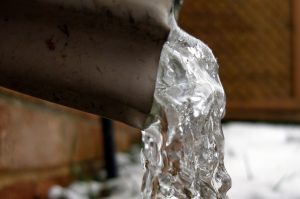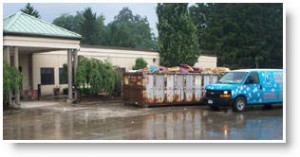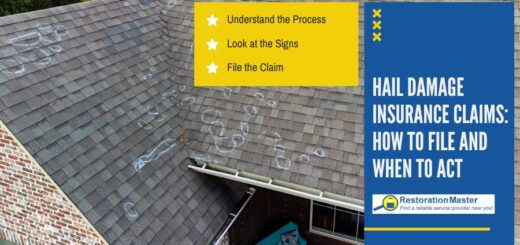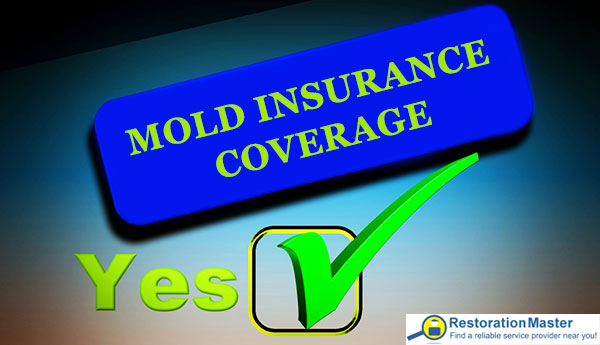Can Homeowner’s Insurance Cover the Damage from Frozen Pipes?
All throughout the winter, homes are vulnerable to the possibility of burst pipes. Pipe bursts typically occur when the water within the pipes freezes and expands, building the pressure within the pipe until it finally ruptures. As much as a couple hundred gallons of water can spill into your home within a couple hours, leading to extensive damage and moldMold is a type of fungus that grows in damp or humid conditi... More growth. During the winter, frozen pipes are among the most common causes of significant property damage.
When a pipe burst occurs, many homeowners might immediately wonder, will my homeowner’s insurance cover the damage? In general, homeowner’s insuranceHomeowner’s insurance is a policy that provides financial ... More does cover water damage caused by a burst pipe, but not the damage to the pipe or plumbing equipment. There may also be other stipulations, depending on your coverage, when it comes to covering damage from a burst pipe, such as possible negligence. This guide will help you through the insurance claim process to cover water damage from frozen pipes.
Homeowner’s Insurance and Frozen Pipes
It is beneficial for homeowners to have a thorough understanding of their homeowner’s insurance coverage before ever dealing with a disaster. By doing so, you will have a much better idea of what to expect from your insurance company if you experience a sudden disaster like a burst pipe. In most frozen pipe cases, your insurance provider will cover the damage caused by the water that has leaked out of the pipe. Depending on the exact terms of your policy, you can expect it to cover:

- The cost of removing and replacing the wall to get to the burst pipe.
- RepairRepair is the act of fixing or restoring damaged property, m... More of any damage to your carpeting, flooring, drywall, and furnishings.
- Water damage restoration and moldMold is a type of fungus that grows in damp or humid conditi... More preventionPrevention refers to actions taken to reduce the likelihood ... More
What to Do After a Frozen Pipe Occurs
If you experience a frozen pipe in your home, you must take the right steps in the aftermath to help ensure that your insurance provider accepts your claim. Make sure you take these actions immediately after a pipe burst:
- Stop the damage: A lot of water can leak from a burst pipe in a short period of time, which can cause very serious damage. You must immediately react to stop the spread of the water and limit the damage. Start by shutting off the water at the emergency shut-off valve. Once the flow of water has stopped, call a professional that can provide water damage restoration. If you do not take action to stop the damage, your insurance company may cite this as a reason to deny your claim.
- Document the damage: As with any other type of insurance claim, it helps to fully document the damage caused by a pipe burst. Take pictures of damaged items including the wall, flooring, and the pipe itself. Thorough documentation of the damage will allow you to easily resolve any questions about your claim.
- Contact insurance company: After you have taken steps to slow the spread of the damage and document its effects, it is time to call your insurance provider. When talking with an insurance representative, it is very important to refer to the damage as “water damage.” You should never use the word “flood” because insurance companies deal with floodingFlooding is the overflow or accumulation of water in areas t... More differently. Make sure your insurance company will cover the costs of the restorationRestoration is the process of returning a property to its pr... More including the repairRepair is the act of fixing or restoring damaged property, m... More or replacement of flooring, drywall, carpeting, furnishings, and other personal belongings that were damaged. If you must temporarily leave your home for the repairs to be completed, your insurance company may reimburse your living expenses.
What is Not Covered by Insurance?
While the majority of cases involving burst pipes will be covered by insurance, there are several reasons that your insurance provider can deny coverage. It is important to remember that the cost of the repairs to the burst pipe will not be covered. This is considered general home maintenanceMaintenance is the routine care, inspection, and repair of a... More and is the responsibility of the homeowner. The following are the main reasons that an insurance company may cite to deny covering damage caused by a burst pipe:
-
- Flood damage: As mentioned earlier, it is very important that you never use the word “flood” to describe the damage to your home. If your insurance company considers the damage a flood, it can deny coverage. In home floodingFlooding is the overflow or accumulation of water in areas t... More is typically only covered by flood insurance policies which must be purchased separately from a normal homeowner’s insuranceHomeowner’s insurance is a policy that provides financial ... More policy.
- Negligence: Negligence is the most often cited reason for refusing to cover the damage from a frozen pipe. An insurance company may site negligence if you did not take any precautionary measures to prevent frozen pipes in your home. Your claim can also be denied on the basis of normal wear and tear if the pipe that burst was damaged or corroded to begin with. It is your responsibility as a homeowner to take preventative measures against frozen pipes and repairRepair is the act of fixing or restoring damaged property, m... More or replace parts of the plumbing system when necessary. It helps to document the preventive actions you take so you can prove it if you need to file an insurance claim.
Preventing Frozen Pipes
You can take the following actions to help prevent frozen pipes and ensure that you will be covered if a pipe does freeze and burst despite your efforts:
- Keep the faucets in your home slightly turned on when the temperature drops below freezing so that there is a slow trickle. This will help keep the water moving within the pipes and prevent freezing.
- Set the heating in your home no lower than 65 degrees.
- Keep cabinet doors below kitchen and bathroom sinks open so the home’s heating can reach the pipes underneath.
- Take garden hoses inside and cover outside faucets in the winter.
- Know where the main water shut-off valve is.
- Install pipe insulationInsulation is a material used in buildings to reduce the tra... More or heating tape on pipes in areas with little insulationInsulation is a material used in buildings to reduce the tra... More like attics, crawlspaces, and exterior walls.
- Keep windows and open-air vents closed.
- Keep your basement well heated.
- Shut off the water in your home if you will be away for an extended period during the winter.
Pipe bursts can happen suddenly due to frozen pipes in the winter, and they can cause significant, widespread damage in a short period of time. Fortunately, your homeowner’s insuranceHomeowner’s insurance is a policy that provides financial ... More is likely to cover the resulting water damage as long as you take the right precautionary measures to avoid being cited for negligence. When it comes to dealing with the damage, it is important to contact a trusted water damage restorationWater damage restoration is the professional process of clea... More professional that can handle the aftermath of a burst pipe. These professionals have the right tools to fully restore the damage, and they will even work with your insurance company on the claim.













